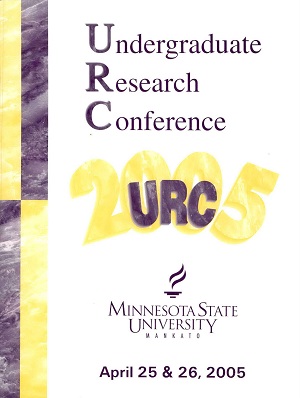Effects of Stress During Sporulation on the Germination Rate of Spores
Location
CSU 255
Start Date
26-4-2005 10:00 AM
End Date
26-4-2005 12:00 PM
Student's Major
College of Science, Engineering and Technology
Student's College
Science, Engineering and Technology
Mentor's Name
Dorothy Wrigley
Mentor's Department
Biological Sciences
Mentor's College
Science, Engineering and Technology
Description
Bacillus cereiis is a spore forming bacterium that can cause food-home disease. It is very important to control this bacterium in food in order to prevent disease and spoilage. Control is difficult because of the ability of the organisms to make endospores which are more resistant to treatments to eliminate bacteria than the vegetative cells. This study is examining the effects of stress during spore formation on the germination of the endospores. It is hypothesized that stress during formation may enhance the resistance of the endospores to various treatments used to control its growth such as nisin addition and heat treatments. Nisin is a biopreservative. Spores were formed under stress of temperature shift, presence of sub-lethal concentrations of nisin, and pH differences. To date the data has shown that sub-lethal nisin stress does affect the germination slightly. In addition, I have confirmed research that indicates that B. cereus will not form spores at pH 4. Additional data will be presented.
Effects of Stress During Sporulation on the Germination Rate of Spores
CSU 255
Bacillus cereiis is a spore forming bacterium that can cause food-home disease. It is very important to control this bacterium in food in order to prevent disease and spoilage. Control is difficult because of the ability of the organisms to make endospores which are more resistant to treatments to eliminate bacteria than the vegetative cells. This study is examining the effects of stress during spore formation on the germination of the endospores. It is hypothesized that stress during formation may enhance the resistance of the endospores to various treatments used to control its growth such as nisin addition and heat treatments. Nisin is a biopreservative. Spores were formed under stress of temperature shift, presence of sub-lethal concentrations of nisin, and pH differences. To date the data has shown that sub-lethal nisin stress does affect the germination slightly. In addition, I have confirmed research that indicates that B. cereus will not form spores at pH 4. Additional data will be presented.




